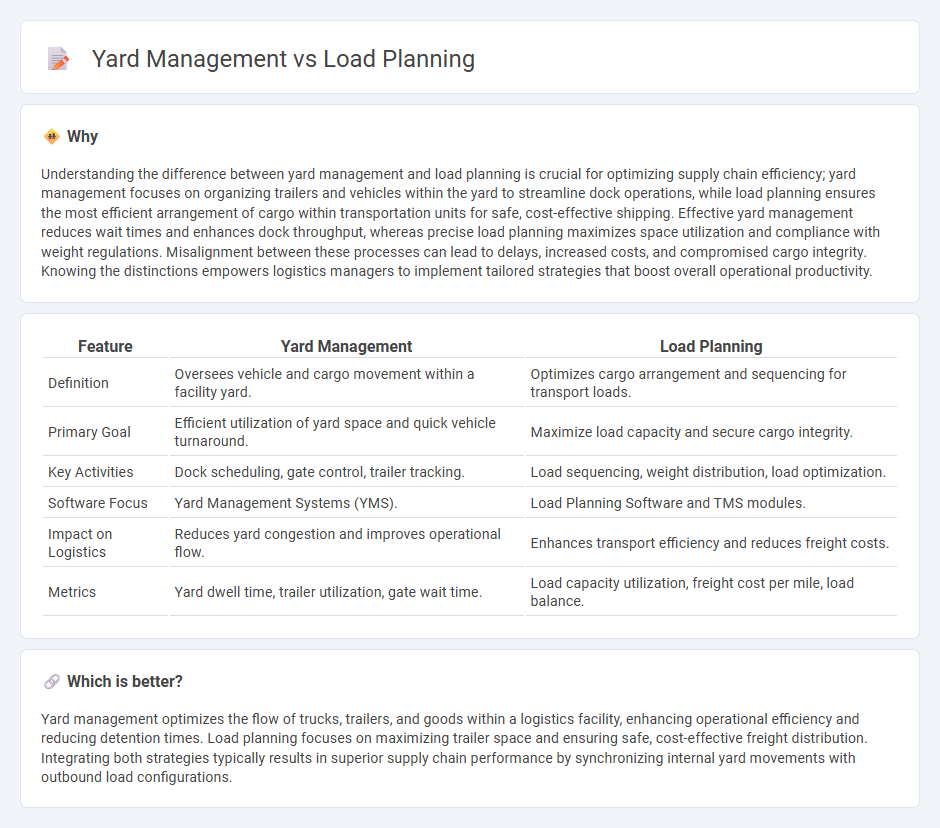
Yard management focuses on optimizing the flow and storage of trailers and freight within a facility's yard to improve efficiency and reduce operational costs. Load planning involves organizing cargo space and sequencing shipments to maximize transportation capacity and ensure timely deliveries. Explore how integrating yard management and load planning can transform your logistics operations.
Why it is important
Understanding the difference between yard management and load planning is crucial for optimizing supply chain efficiency; yard management focuses on organizing trailers and vehicles within the yard to streamline dock operations, while load planning ensures the most efficient arrangement of cargo within transportation units for safe, cost-effective shipping. Effective yard management reduces wait times and enhances dock throughput, whereas precise load planning maximizes space utilization and compliance with weight regulations. Misalignment between these processes can lead to delays, increased costs, and compromised cargo integrity. Knowing the distinctions empowers logistics managers to implement tailored strategies that boost overall operational productivity.
Comparison Table
| Feature | Yard Management | Load Planning |
|---|---|---|
| Definition | Oversees vehicle and cargo movement within a facility yard. | Optimizes cargo arrangement and sequencing for transport loads. |
| Primary Goal | Efficient utilization of yard space and quick vehicle turnaround. | Maximize load capacity and secure cargo integrity. |
| Key Activities | Dock scheduling, gate control, trailer tracking. | Load sequencing, weight distribution, load optimization. |
| Software Focus | Yard Management Systems (YMS). | Load Planning Software and TMS modules. |
| Impact on Logistics | Reduces yard congestion and improves operational flow. | Enhances transport efficiency and reduces freight costs. |
| Metrics | Yard dwell time, trailer utilization, gate wait time. | Load capacity utilization, freight cost per mile, load balance. |
Which is better?
Yard management optimizes the flow of trucks, trailers, and goods within a logistics facility, enhancing operational efficiency and reducing detention times. Load planning focuses on maximizing trailer space and ensuring safe, cost-effective freight distribution. Integrating both strategies typically results in superior supply chain performance by synchronizing internal yard movements with outbound load configurations.
Connection
Yard management optimizes the storage and movement of trailers within a facility, directly influencing load planning by ensuring timely availability and efficient sequencing of shipments. Effective coordination between yard operations and load planning reduces wait times, minimizes dock congestion, and improves overall supply chain throughput. Integrating real-time yard data with load planning systems enhances decision-making accuracy, leading to cost savings and increased delivery reliability.
Key Terms
**Load Planning**
Load planning optimizes the arrangement and consolidation of cargo to maximize transport efficiency, reduce shipping costs, and ensure timely deliveries. It involves detailed analysis of load weight, volume, and destination to create balanced and safe load distributions. Discover more about how advanced load planning systems can improve supply chain performance.
Load Optimization
Load planning focuses on maximizing transportation efficiency by determining the best way to arrange cargo within trailers to optimize space utilization and reduce shipping costs. Yard management oversees the organization and movement of vehicles within a facility to ensure smooth loading and unloading processes, minimizing delays and congestion. Discover more about how integrating load planning with yard management can enhance overall load optimization strategies.
Freight Consolidation
Freight consolidation in load planning optimizes shipment efficiency by combining multiple smaller loads into a single, cost-effective delivery, reducing transportation costs and minimizing environmental impact. Yard management ensures smooth coordination of inbound and outbound trailers, enhancing space utilization and timely dispatch that supports consolidated freight loads. Explore how integrating load planning with yard management can drive operational efficiency and freight consolidation benefits.
Source and External Links
Load Planning: How to Use It to Reduce Transportation Costs - Load planning is the strategic process of consolidating cargo to maximize truck capacity, reduce the number of vehicles, and lower transportation costs while considering factors like vehicle specs, weight distribution, and delivery routes.
What is Load Planning: Optimizations & Benefits - Maveneer - Load planning involves organizing how goods are placed within transport vehicles to optimize space, reduce costs, ensure product safety, and comply with regulations for efficient logistics operations.
A Guide to Load Planning and Optimization - Averitt - Effective load planning maximizes truck trailer space usage, ensures safe and even weight distribution, considers freight compatibility, and uses technology to prevent delays and optimize shipments.
 dowidth.com
dowidth.com